Hello everyone welcome to this article where I will be giving a brief information on my roots, my origin.
MY ROOTS
I am Clautilda Tengu Atanga a Cameroonian hail from the Grass field of the North West region of Cameroon, Momo division, Mbengwi. I will be presenting to you the origin of The Meta people.
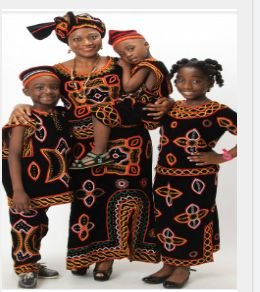 an example of traditional grass field family
an example of traditional grass field family
The Meta people belong to the Widikum tribe and happen to have migrated some 500-600 years from a place between Cameroon and Nigeria known as Nsanakang in the North Eastern part of Calabar in Nigeria. The migration history and family settlement of the Meta people as a take off from Ntarkon South West of Batibo village close to present Kokum and Bukah Batibo. The father of Meta called "menemo" the menkah had many children with his wife Apumokah named them leaders of their people. Amongst them 3 ancestral family leaders were identified according to seniority;
1.Tegyen icha mendik family Of Zang-Tabi
2.Tembeng Njoh Bonjoh family of Teneku
3.Tete Mundam family of Tuanyang. These leaders were all assisted in the migration settlement way of life by other three families, the Bonogoups known as the architectural family, calvers, those who mould pots, build houses, produce weapons and and farm tools; Mutems are the war Lords, those who were the fighters and defend the land and palace, Bokwanis were entertainers ( musics especially to the fons), carve chairs, walking stalks but these families have never been fons the only assisted in the movement.
HOW THEY MOVED
Migration started with Tegyen Icha westwards through Ajieh in Ngie subdivision and settled in Zang-mbeng the palace in Ngoukwo where he had many children who now make up the mendik family in Meta. Amongst these children can be identified in order of seniority;
1.Mbakwa of aTugi
- Fominyen of Nyen
3.Forombong of Ngoudom
4.Fonghuh of Ku
5.Teboh of Njekwoh - Fomukwen of kwen
7.Fon from Funam.
These seven children formed the seven ancestral leanage of the land. Others sent to the hinterlands administered the hamlets and family heads who were not of his particular leanage who form the seven stones. They include; Mbabit of Mbemi, Fominyen of Njinibi and Mbanek of Choup. They together joined together and now multiplied as the family heads of villages ( now formed different villages in the land)
The next movement was by Tembeng Njoh of Teneku who migrated Eastward from Ntarkon through Nyinjie Bounji. At Oshoung he delivered Fon Akam of Kai who moved towards Bosah before coming to back to his present settlement and he had child who became the Fon of Funam Bome. At Teneku he had another child Weribad ( a family head in Zang called Bad) who had Mbatu Njah Etu and Fotuh Njinimetu.
Tete migrated Eastwards through Nyinjie Bounji Oshoung, Bahd, Njah Etu and to present day Tuanyang called Fobang of Tuanyang. He had many children who spread throughout meta but were all paying aligence to him in Tuanyang and to the family head of the other brothers
The people of my village Ngyen-mbo had a special kind of migration in that the returned late from the farm when the others had left so never followed the normal family movement. They moved Eastwards and settled in Nanfang Bali before the Bali people occupied the land. They later moved when the Bali came and defeated them and settled there since they were not powerful. They remained there till the Germans came and defeated, used them as slaves till the Germans were defeated in the first and second world war and we're freed by the British and they now moved towards Independence with the assistance of the Meta people and Widikum. They later moved to their settlement area in Ngyen-mbo. There are 3 fons who have a common council ruling the same community.
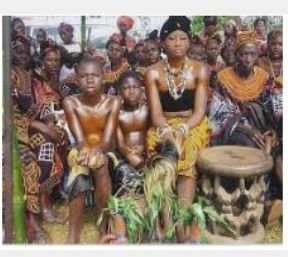 a royal family insertion
a royal family insertion
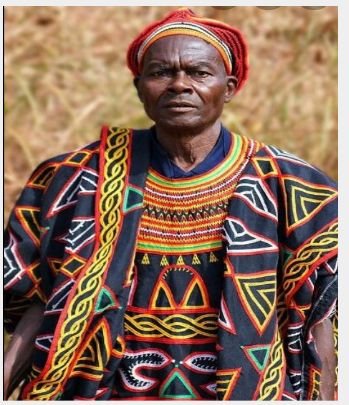
A traditional dressed Meta man
REASONS FOR MIGRATION
The people moved from a place called "ntarinkon" in Guzang Batibo. This is market where traders come from other places to sell their products. The Meta people were also traders at this market but they were different from others in that they had a tail. These set of traders will always come very early to the market and take their positions and be the last to leave which made other traders suspicious. So some traders decided to know how they came to the market one day. They realized that these people had a tail from behind which they hide in holes they had dug and would sit there the whole day. Upon realising this, they decided to deal with the Meta people. One day they got ants and put in all the holes in the market and when these people came in the morning as usual and sat down with their tails in the hole, they were bitten by the ants and they ran away from the market and never came back. This was how they moved to where they are settled now called Mbengwi. Mbengwi is made up of 29 villages and 31 chiefs. The place is a habitat for many other tribes in the country and other countries too.
Customs and tradition
The Meta people are known and the Palm trees climbers. The area is made up of so many rafia palms and palm trees which are exploited for its sweet wine, oil, kernel, wood and used for protection. During war times the Meta people fought but would not leave their palm trees. The remained under the trees and climb up to hide.
The Meta people are good farmers. They cultivate crops like maize, beans, cocoyam, yam, cassava, potato, plantain, soybeans, palm trees and vegetables. During the cultivation period in the early ages, a law was set where everyone works at the same time. A portion of land is selected and everyone is given a date for the beginning of cultivation of crops. Everyone goes to the farm on a set day to clear, work and plant. After this no one is expected to go to the farm again until someone from the palace is sent to check if crops like vegetables are ready for harvest. A day is also set and everyone goes to harvest and come back. Later crops with longer seasons are checked for weeding and it is done on a set day too and harvesting on the set date. This was done in this manner because there were so many wild animals around that attacked farmers on their way to the farm or in the farm. So this served as a means for the men to protect the women as they work and assist others too with their farming. Also the men would always moved with the baby nursers in front as they went to the farm, women in the middle and other men behind to protect them. During this period of farming anyone who violates the law set pays for missing crops in the fine along with other items like goats and chickens. Crops harvested are stored in barns, warehouses and some dig the ground to keep tubers.
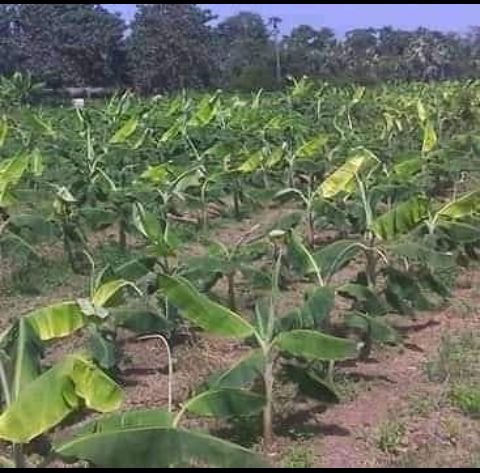 A plantain farm in Tudig village
A plantain farm in Tudig village
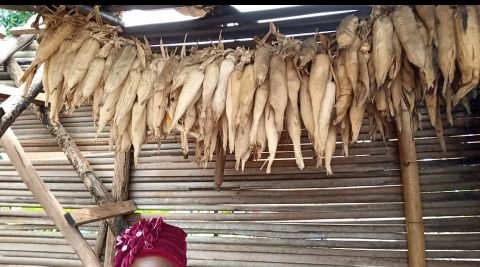 storage of maize
storage of maize
Traditional dances
- Kwihfor ( chief dance)
- Sambeh ( strong dance for men with a strict law of drawn line where no one passes if not you will have a heavy fine to the palace. Special dabce at the funeral of a chief)
- Mukonghu (common dance for all
- Echibi (common dance)
- Mendere (special dance for occasions organized by the chiefs
- Ekwem (common dance for men)
- Mbangaloum (common dance for all)
- Tiwara (special occasions according to chiefs)
- Masanghah ( women's dance)
- Enangahmukobi (some special occasions, dance for women)
- Kumnjang (special dance for all according to families)
- Ekati (first dance in any occasion)
- Edoum (elder people's dance)
- Igwih (goat dance for women)
- Ekarabang (elderly people dance perfomed with all kind animals stuff)
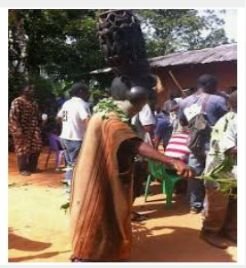 juju dance
juju dance
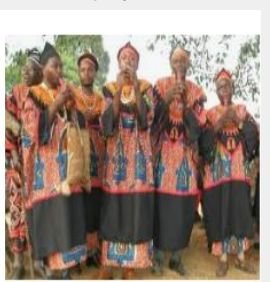
Men's flute dance
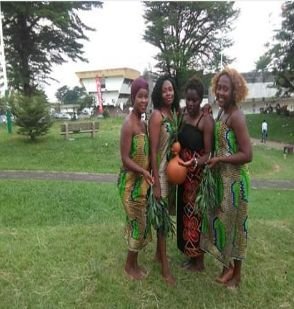 my friends an I after the Ekwem dance performance
my friends an I after the Ekwem dance performance
Traditional meals
- Enang tare (poridge cocoyam)
- Achu and yellow soup
- Yam/cocoyam and egusi pudding/cocoyam leaf.
- Roasted cocoyam or
plantain or cassava or yam or potato and red oil.
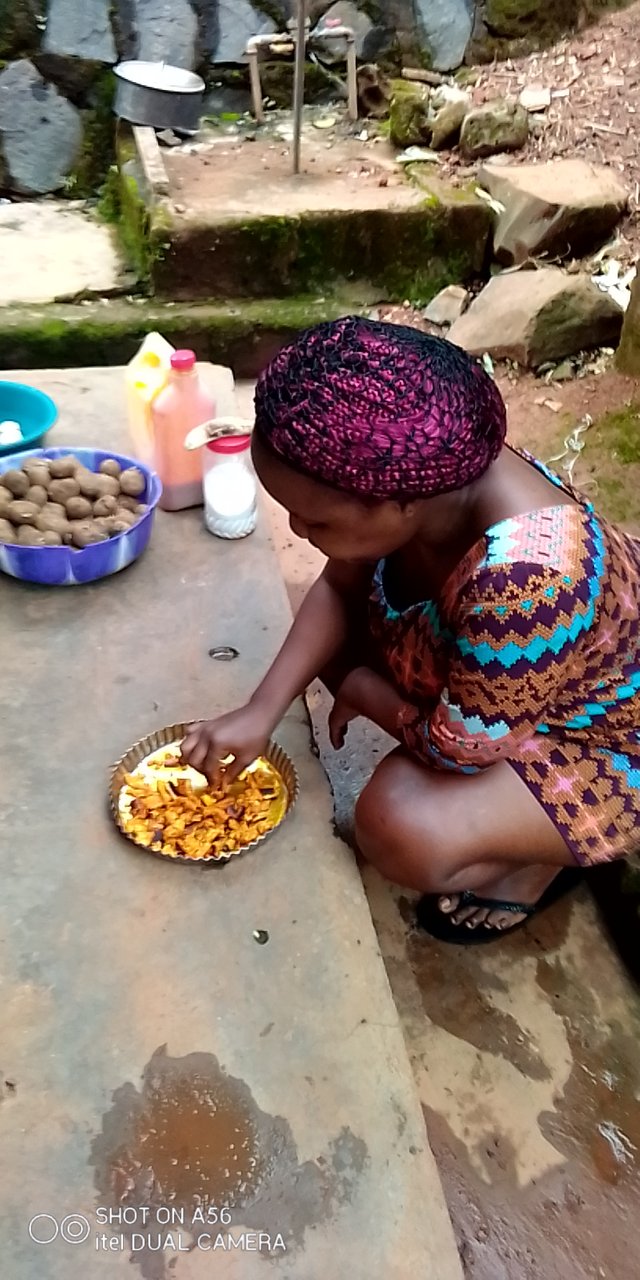 Eating my roasted plantain and oil
Eating my roasted plantain and oil
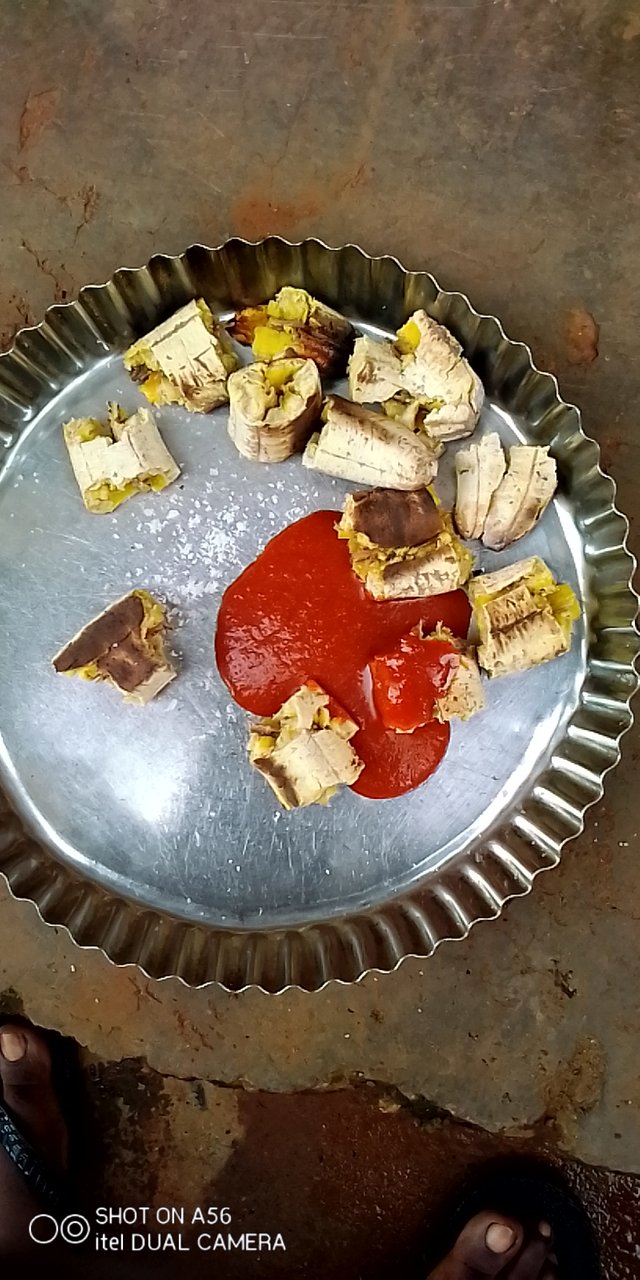 plantain and palm oil with. A pinch of salt
plantain and palm oil with. A pinch of salt
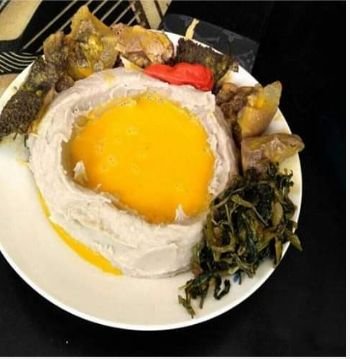 Achu and yellow soup
Achu and yellow soup
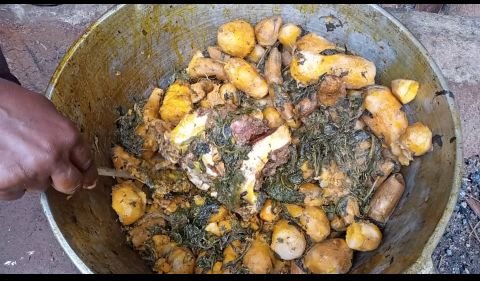 A pot of "bang tare"
A pot of "bang tare"
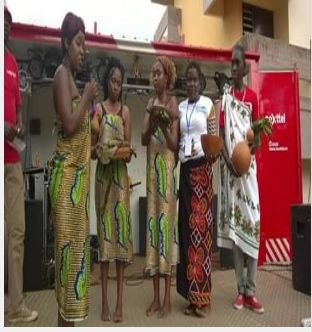 Me doing a presentation of bang tare during a cultural event
Me doing a presentation of bang tare during a cultural event
Traditional wedding
From ages parents were responsible for selecting the bride for their children and seal the union. This used to be a very important exercise in the tradition and was highly regarded with great value. A girl who is not married is always regarded as a cursed girl and so everyone was excited to be married no matter the family in which the man comes from. For weddings a bride price was usually some valuable items like cowries, other precious metals accompanied with palm wine, palm oil, goat, pigs, fowls and then the traditional meal. Traditional weddings are always very exciting ranging from preparing the girl for marriage (kept for 3months in a grooming room and taught so many things concerning marriage), the preparation activities before and during the wedding. A wedding is fully done when the bride is taken to her husband's house the same day and fully immersed in camwood oil. This same process still happens in this ages and it's so interesting and worth living.
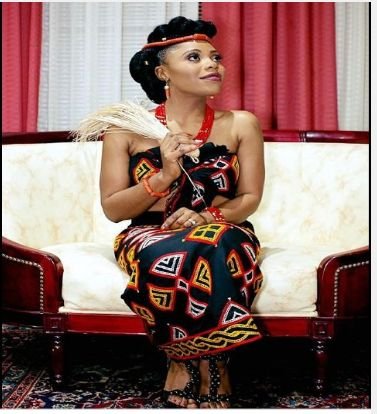 A bride
A bride
Other traditional celebrations
There are so many celebrations in the meta land which ranges from traditional marriages, dead celebrations, harvest festival, end of year festivals, cultural week celebrations, born houses, enthronement of a new chief.
Meaning of some things in the Meta land
- A chief is called "mbeh"
- An elderly man is called "Ni"
- An elderly woman is called "Ave"
- A Newly wedded woman is called "eghen"
- A woman who gives birth to twins is called "manyi"
- A man who gives birth to twins is called "tanyi"
- A young lady is called "ewaneyih"
- A young boy is called "Ewan mbangah"
- A twin is called "ekomgheh"
- Someone who lives in town or city is called "kwikob"
- A town or city is called "kob"
The Meta people are people of great prestige and honor. The oil zone of the North West region of Cameroon. I belong to the Ngyen-mbo family of the Meta people who are the most hard-working people in the land, the most industrious people in terms of farming, generous and welcoming to strangers.
Hope you all learned something from the origin of the Meta people. Thanks for reading through. Thanks @steemalive community for this opportunity to present my roots. All credits goes to Mr Fobang Roland who gave me information concerning the migration and settlement of the Meta people, my grandma, my mother for additional cultural information. I will also thank @njiatanga and @focusnow for their endless efforts to support me.

Subscribe:::Discord.
:::Whatsapp :::join trail :::Steemalive Website
great post.
Downvoting a post can decrease pending rewards and make it less visible. Common reasons:
Submit
Thank you
Downvoting a post can decrease pending rewards and make it less visible. Common reasons:
Submit
Thank you for telling a little about the origin of the meta people. I've never heard of it and today I already know the origin story of the meta because you tell it. and keep the spirit in making posts. I like to read posts that make us add to history
Downvoting a post can decrease pending rewards and make it less visible. Common reasons:
Submit
Thanks for reading through this small history about my roots. There's still more which I can't put all here. I'm happy you learned something from the write up
#twopercent #cameroon
Downvoting a post can decrease pending rewards and make it less visible. Common reasons:
Submit
Whoa... That's awesome. But how do you guys keep up with so many traditional dances? It's a tad bit stressful I think
Downvoting a post can decrease pending rewards and make it less visible. Common reasons:
Submit
There are many more and most of them are performed on particular occasions, some performed by special set of people and others are common for everyone like the Mukonghu dance. They're all great dances. For me I love the Echibi dance so much
#twopercent #cameroon
Downvoting a post can decrease pending rewards and make it less visible. Common reasons:
Submit
Wow... And I reckon it's great
Downvoting a post can decrease pending rewards and make it less visible. Common reasons:
Submit
Wow..this is [email protected] love your history.am so interested in the food.how i wish am very close to enjoy the sumptious meal.i love your tradition.keep it up.
#twopercent #nigeria
Downvoting a post can decrease pending rewards and make it less visible. Common reasons:
Submit
Thank you very much. You will enjoy the food when you get to eat it. It's so delicious
#twopercent #cameroon
Downvoting a post can decrease pending rewards and make it less visible. Common reasons:
Submit
Wow is nice tradition yours tradition is more powerful than our own because everything there is foods
Downvoting a post can decrease pending rewards and make it less visible. Common reasons:
Submit
Thank you my friend. Tradition is something very important for us to know
#twopercent #cameroon
Downvoting a post can decrease pending rewards and make it less visible. Common reasons:
Submit
Hi @tenguhatanga.. you're on our Curation List for 500SP Minnowsupport Program.
Please remember to support others in the Newcomers Community by commenting and upvoting their post. Thank you.
You have been upvoted by @rex-sumon, Steem Greeters from STEEM POD Project and we are voting with the Steemit Community Curator @steemcurator03 account to support the newcomers coming into steemit and for curating 500SP Minnowsupport Program 500SP Minnowsupport Program
Follow @steemitblog for the latest update on Steem Community.
Check out the on going contest that happening on Steemit Community right now here Ongoing Contest on Steemit
Downvoting a post can decrease pending rewards and make it less visible. Common reasons:
Submit
Thanks a million for your support and encouragement @steemcurator03 and @rex-sumon. I will keep on following the instructions as required
#twopercent #cameroon
Downvoting a post can decrease pending rewards and make it less visible. Common reasons:
Submit